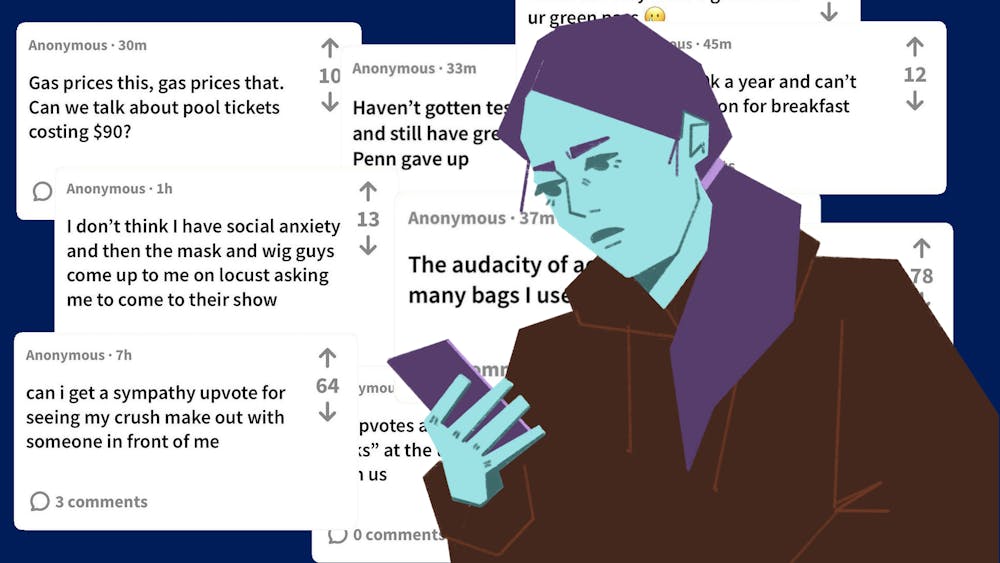Social media apps dominate college campuses. They act as methods for students to connect and share memes, struggles, personal antidotes, and anything else that crosses their mind. But a new generation of social media apps are embracing anonymity—from Snapchat to Yik Yak, apps are embracing the unseen. Most recently, a new app called Sidechat is making waves in the anonymous app space, blowing up on college campuses across the nation—but what exactly is it?
Some apps like Instagram have built a culture of aesthetically pleasing vibes and perfect, postable, curated content, regardless of whether it reflects reality. In contrast, Sidechat embraces a genuine, low–key aesthetic that is clearly seen in its app design and function. The interface is simple and intuitive, with "karmic" upvotes and downvotes on anonymous posts. The app's function is almost addictive—it takes little effort to be sucked into the relaxed and humorous world of Sidechat.
But the background of Sidechat is even more elusive than its avid anonymous users. The founders prefer to keep things quiet, resulting in a lack of interviews about the app's inception and mission. Its LinkedIn page is equally understated and suggests that the company is small, with an estimated two to ten employees.
But its approach to conquering college campuses is anything but conventional for a social media app. Sidechat used a simple grassroots strategy to recruit students to introduce the app to their campus.
Omotoyosi Abu (W '24 and E '25) was a brand ambassador for Sidechat, describing its marketing strategy as having pre–established brand ambassadors recruit their friends as campus spokespeople to help launch the app on new campuses. Through this campaign, Toyosi was contacted to help launch Sidechat at Penn.
“[The launch] consisted of trying to get people to download the app. [We did this by] trying to buy collaborations with student groups on campus to help promote the app, trying to find popular social media pages to help promote the [app], setting up tables around Locust Walk, and flyer distribution,” Toyosi explains.
Toyosi was drawn to the app because of how it separates itself from other anonymous social media apps. “It's [the] intersection between Reddit and Yik Yak. Reddit isn't [completely] anonymous. People [can] make [their usernames] weird things because they want anonymity … [But] I've had frustrations with Reddit … I don't post [on Reddit] anymore because my username is close to my real name,” Toyosi says.
On the other side of the spectrum, Yik Yak allows for total anonymity, which can embolden users to post derogatory and inflammatory comments because they don’t fear consequences. But Toyosi explains that Sidechat is the perfect balance between anonymity and accountability. He states that an anonymous app should be anonymous to other users so that they can post candidly. However, he also says that the backend of the ideal anonymous app should be trackable, meaning that the app can still hold users accountable for what they say and moderate content—and Sidechat accomplishes just that.
Emma Gwan–Nulla (C '25) is an avid user of Sidechat. She was introduced to the app when offered a free cookie by brand ambassadors like Toyosi promoting the app on campus. At first, she downloaded the app with little thought in order to get a free cookie, but eventually, she was sucked in.
According to Emma, Sidechat isn't just an app for anonymous shitposts—it's also a place for students to find out about what's going on around campus. “Somebody was talking [about an event] at NOTO, and they found it on Sidechat. I was [intrigued that the person was] keeping themself in the know through Sidechat. The app is very entertaining,” Emma recalls.
Unsurprisingly, an app that captures the random thoughts of hundreds of college students is bound to have some amusing tidbits that keep people scrolling. For instance, a staff member at the 1920 Commons has become the muse for several posts on the app. Known as Ms. Anita, her welcoming presence has turned her into a Sidechat celebrity, with members praising her for her warm attitude and sweet greetings.
“A lot of the [posts] are about the lady at Commons that calls everybody ‘baby.’ I didn't know her name until Sidechat. I definitely think I asked her at the very beginning of the year and I forgot. I was afraid to ask her again. I just tell her, ‘You make my day,’ and I keep it going. But now I know her name, “ Emma says.

But Sidechat provides students with much more than just memes—it also creates a community for students to vent about feelings and experiences without the direct judgment of others. Emma experienced a racially motivated incident that left her feeling unhappy. And to vent about her feelings, she posted about it on Sidechat.
To her shock, she received a flood of comments offering support and reproaching the incident.
Emma recounts, “It felt like there was a community that was also able to [understand me]. So when it blew up, It was really exciting. I remember my day was much better because like I [initially thought that] no one on this campus cares—but to even see anonymous people that I know go to Penn that care is really validating.”
More so, the real feelings of students are expressed easily in multiple formats. Sometimes these posts are simple encouragements and other times these posts are delivered through timely memes.

Behind the safety of anonymity, Sidechat combats our notoriously preprofessional culture and "Penn Face" by providing an online space for students to express their struggles. Through anonymous memes, posts, and vents, Sidechat shows us the unfiltered truth about the Penn experience in all of its tired, several–lectures–behind, barely–functioning glory.







